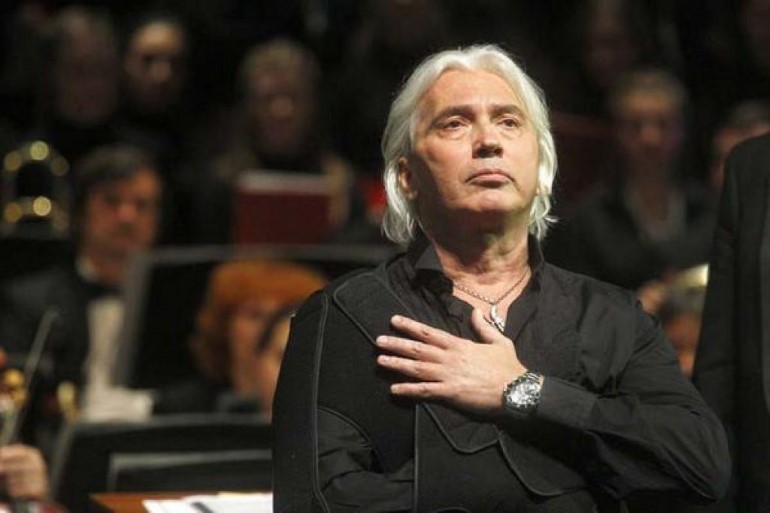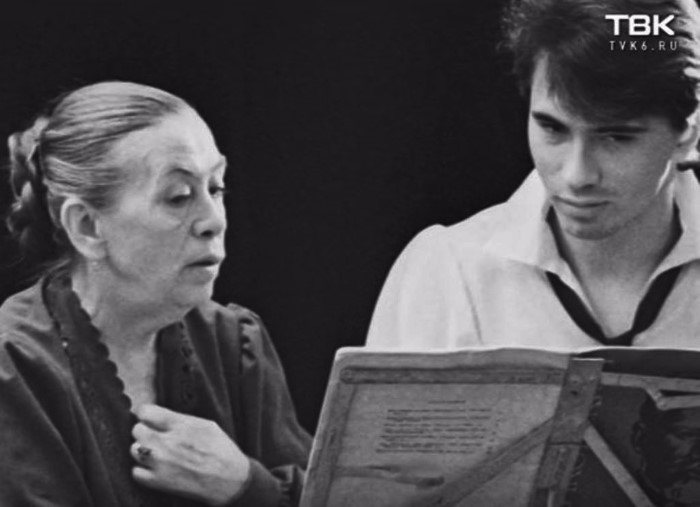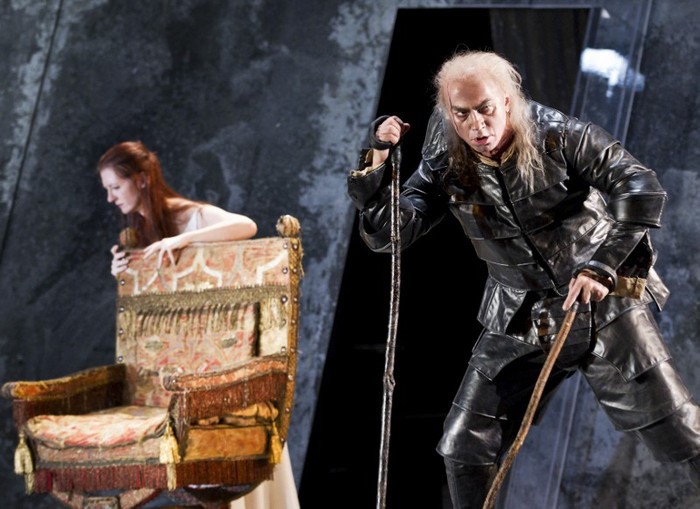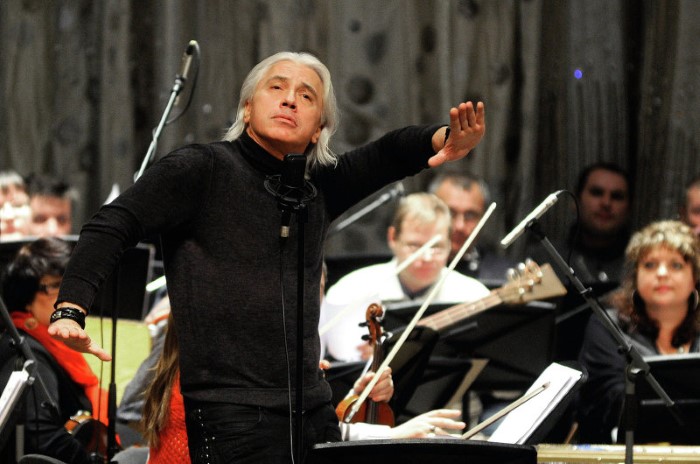
Dmitri Hvorostovsky: I Want to Evoke Powerful Emotions
/ Главная / Russkiy Mir Foundation / Publications / Dmitri Hvorostovsky: I Want to Evoke Powerful EmotionsDmitri Hvorostovsky: I Want to Evoke Powerful Emotions
Anna Genova

On 22 November Russia’s greatest baritone passed away. He worshipped Enrico Caruso, Mario Lanza, and Feodor Chaliapin—names that are etched into the history of vocal artistry. And now one more joins their ranks—Dmitri Hvorostovsky.
When Dima Hvorostovsky was four years old, his mom played for him Chaliapin’s performance as Mephistopheles in Gounod’s opera. And although the little boy didn’t understand the language (it was performed in the original French), he decided he would become a singer. Everyone in Hvorostovsky’s family loved music. His father was a classical music lover and watched attentively over the development of his son’s musical abilities.
The house had a quite extensive musical library. Admittedly, hooligans paraded about on the streets of Krasnoyarsk. Perhaps it was actually due to his boyhood fights that a real fighting spirit awakened in Dima—one that was quite unmanageable at first: to his parents’ horror, he joined a rock band in his youth and threatened to leave home to work on a Siberian railway. Truth be told, even in his mature years, Dmitri occasionally demonstrated his fiery temperament in his interactions with colleagues on stage.
Nonetheless, he graduated from a music school and then enrolled in the Krasnoyarsk Institute of the Arts, followed by the Krasnoyarsk State Theater of Opera and Ballet, and then some of the greatest venues in the world. Despite having no connections on the Western stage, at the age of 25 he earned the title “Best Singer in the World” in the BBC Cardiff Singer of the World competition, which was the beginning of his career as an international star.
In 1991 Hvorostovsky was already singing with the Boston Symphony Orchestra under the direction of Seiji Ozawa at the renowned Tanglewood Festival, performing in Tchaikovsky’s opera The Queen of Spades. Dmitri played the part of Yeletsky. He would play the same role several years later at the New York Metropolitan Opera alongside Placido Domingo and Elisabeth Söderström. This production also featured his classmate from the Krasnoyarsk Conservatory Nikolai Putilin, who studied along with Hvorostovsky under the famed vocal instructor Ekaterina Konstantinovna Iofel’. More than 100 famous singers were nurtured by this wonderful teacher, who herself passed away very recently, in January of this year, at the age of 93.

D. Hvorostovsky and E. Iofel’. [Photo: tvk6.ru]
After his sensational win at the international contest in Cardiff, this baritone was much in demand. He received engagements at the best opera theaters, including Convent Garden, the Berlin State Opera, La Scala, and the Vienna State Opera. At the Metropolitan opera alone, Hvorostovsky performed more than 180 times, performing the titular parts in Don Juan, Rigoletto, Don Carlos, Il Trovatore, and others. In memory of this singer, who has already carried the epithet “great” for some time, the halls of this major opera theater will resound with four performances of the Requiem by Giuseppe Verdi, one of the singer’s favorite composers. Hvorostovsky is also being remembered by the Vienna State Opera, which has raised a black flag to mourn the musician. The Queen’s Opera in London is dedicating its upcoming premiere of Rigoletto to Hvorostovsky. The audience at the Convent Garden remember how this physically well-built singer and handsome man transformed into a deformed, limping old man, but only other singers can understand how difficult it was to sing in this bent-over state.
Seven years went by and Hvorostovsky once again recalled Rigoletto in one of his final performances, in May of this year. The audience’s reaction to the singer’s unexpected appearance at the Metropolitan Opera’s gala concert brought to mind the excited outbursts that meet a rock star onstage. Hvorostovsky performed Rigoletto’s aria “Courtesans, Spawn of Sin,” striving to embody the image fully, in spite of his dinner jacket and the limited range of motion caused by his illness. He succeeded.
Although the singer and his family took up residence in London long ago, he would often say that he spent more time in Russia than in Great Britain. His last concert was held at the end of December 2016 in his native Krasnoyarsk; he overcame his illness to make the trip. Over the course of his active artistic career, the singer worked on more than one occasion with the theaters of Moscow and Petersburg: the Mariinsky, the Novaya Opera, and the Bolshoi.
“I’m a very quiet and modest person, but sometimes I go crazy—I take a wild risk and want to evoke strong emotions,” Hvorostovsky once said in an interview with the British Times. Of course, the singer had in mind his work on the stage, though in life, too, he was an unconventional person.

Dmitri Hvorostovsky, Rigoletto. [Photo: liveinternet.ru]
In 2004 Hvorostovsky gave his first solo concert with an orchestra and choir on Red Square, and it was broadcast live in 25 countries. A couple years later he appeared there again with the famous American singer Renée Fleming. In 2013, viewers were swept off their feet by Hvorostovsky’s duet with the Russia opera diva Anna Netrebko.
In one of his interviews, he was asked whether he wanted to sing in a musical. Hvorostovsky took the idea much further. He managed to elevate not only the melodies of such legendary Soviet songs as “Moscow Nights” and “Dark is the Night,” but also pop hits. And right away he cited as an example the nightclub melodies like the romance “Dark Eyes,” which the great Chaliapin took pleasure in singing. Everything new is something old that’s been forgotten, emphasized Hvorostovsky.
“Since our first encounters, when he was only 25 years old, he performed Russian romances with a very deep understanding of all their dramatic and technical nuances. I think you need to have a special gift to sing them in such a way that the audience doesn’t get bored after two sets,” remembers Ilya Ivari, the well-known Estonian pianist and accompanist, with whom Hvorostovsky often and fruitfully worked. In Hvorostovsky’s rendering, Soviet songs, songs of wartime, and Russian folk songs all took on a whole other meaning. He performed these programs all over Russia—alongside his continuing projects relating to classical music, of course.
The “Hvorostovsky and Friends” project brought a great number of world-famous stars to Russia, many of whom came there because Dmitri invited them. These concerts came to be held for charity—all proceeds from the concerts went to the treatment of seriously ill children.

Dmitri Hvorostovsky performs Soviet hits in Krasnoyarsk. [Photo: ria.ru]
A separate page in the singer’s career is devoted to his very special relationship with the composer Georgy Sviridov. In particular, Hvorostovsky sang in the Los Angeles premiere of the cycle “Russia Cast Adrift” (1994). “After the final chords, the Americans stood up, and it was evident that Sviridov had been accepted and his music would resound all across the world,” remembers the pianist Mikhail Arkad’ev. Hvorostovsky and Arkad’ev also performed the vocal cycle “Petersburg,” which Sviridov wrote specially for the singer.
More recently, Dmitri Hvorostovsky had a hard time walking out on stage, but he nonetheless continued to work in the studio. On 9 June 2017, Delos Records released the new album Russia Cast Adrift, a vocal cycle composed by Georgy Sviridov based on the poems of Sergei Esenin and performed by Hvorostovsky.
On more than one occasion, Dmitri Hvorostovsky was awarded with various titles—an asteroid (7995) discovered by an astronomer at the Crimean astrophysics observatory was even named after him. But the main thing that he earned through his selfless work is the deep respect of his colleagues and the sincere love of his thousands of fans living all over the world.
New publications

 Mikhail Kalatozov, a director who transformed the world of cinematography in many ways, was born 120 years ago. He was a Soviet film official and a propagandist. Above all, he was capable of producing movies that struck viewers with their power and poetic language.
Mikhail Kalatozov, a director who transformed the world of cinematography in many ways, was born 120 years ago. He was a Soviet film official and a propagandist. Above all, he was capable of producing movies that struck viewers with their power and poetic language.  Ukrainian authorities have launched a persecution campaign against the canonical Ukrainian Orthodox Church (UOC), the biggest one in the country's modern history. Over the past year, state sanctions were imposed on clergy representatives, searches were conducted in churches, clergymen were arrested, criminal cases were initiated, the activity of the UOC was banned in various regions of the country, and monasteries and churches were seized.
Ukrainian authorities have launched a persecution campaign against the canonical Ukrainian Orthodox Church (UOC), the biggest one in the country's modern history. Over the past year, state sanctions were imposed on clergy representatives, searches were conducted in churches, clergymen were arrested, criminal cases were initiated, the activity of the UOC was banned in various regions of the country, and monasteries and churches were seized.  When Nektary Kotlyaroff, a fourth-generation Russian Australian and founder of the Russian Orthodox Choir in Sydney, first visited Russia, the first person he spoke to was a cab driver at the airport. Having heard that Nektariy's ancestors left Russia more than 100 years ago, the driver was astonished, "How come you haven't forgotten the Russian language?" Nektary Kotlyaroff repeated his answer in an interview with the Russkiy Mir. His affinity to the Orthodox Church (many of his ancestors and relatives were priests) and the traditions of a large Russian family brought from Russia helped him to preserve the Russian language.
When Nektary Kotlyaroff, a fourth-generation Russian Australian and founder of the Russian Orthodox Choir in Sydney, first visited Russia, the first person he spoke to was a cab driver at the airport. Having heard that Nektariy's ancestors left Russia more than 100 years ago, the driver was astonished, "How come you haven't forgotten the Russian language?" Nektary Kotlyaroff repeated his answer in an interview with the Russkiy Mir. His affinity to the Orthodox Church (many of his ancestors and relatives were priests) and the traditions of a large Russian family brought from Russia helped him to preserve the Russian language.

 The leaders of the Friends of the Great Russia cultural association (Amici Della Grande Russia) in Italy believe that the Western policy of abolishing Russian culture in Europe has finally failed. Furthermore, it was doomed to failure from the beginning.
The leaders of the Friends of the Great Russia cultural association (Amici Della Grande Russia) in Italy believe that the Western policy of abolishing Russian culture in Europe has finally failed. Furthermore, it was doomed to failure from the beginning.  Name of Vladimir Nemirovich-Danchenko is inscribed in the history of Russian theater along with Konstantin Stanislavski, the other founding father of the Moscow Art Theater. Nevertheless, Mr. Nemirovich-Danchenko was a renowned writer, playwright, and theater teacher even before their famous meeting in the Slavic Bazaar restaurant. Furthermore, it was Mr. Nemirovich-Danchenko who came up with the idea of establishing a new "people's" theater believing that the theater could become a "department of public education."
Name of Vladimir Nemirovich-Danchenko is inscribed in the history of Russian theater along with Konstantin Stanislavski, the other founding father of the Moscow Art Theater. Nevertheless, Mr. Nemirovich-Danchenko was a renowned writer, playwright, and theater teacher even before their famous meeting in the Slavic Bazaar restaurant. Furthermore, it was Mr. Nemirovich-Danchenko who came up with the idea of establishing a new "people's" theater believing that the theater could become a "department of public education."  "Russia is a thing of which the intellect cannot conceive..." by Fyodor Tyutchev are famous among Russians at least. December marks the 220th anniversary of the poet's birth. Yet, he never considered poetry to be his life's mission and was preoccupied with matters of a global scale. Mr.Tyutchev fought his war focusing on relations between Russia and the West, the origins of mutual misunderstanding, and the origins of Russophobia. When you read his works today, it feels as though he saw things coming in a crystal ball...
"Russia is a thing of which the intellect cannot conceive..." by Fyodor Tyutchev are famous among Russians at least. December marks the 220th anniversary of the poet's birth. Yet, he never considered poetry to be his life's mission and was preoccupied with matters of a global scale. Mr.Tyutchev fought his war focusing on relations between Russia and the West, the origins of mutual misunderstanding, and the origins of Russophobia. When you read his works today, it feels as though he saw things coming in a crystal ball...